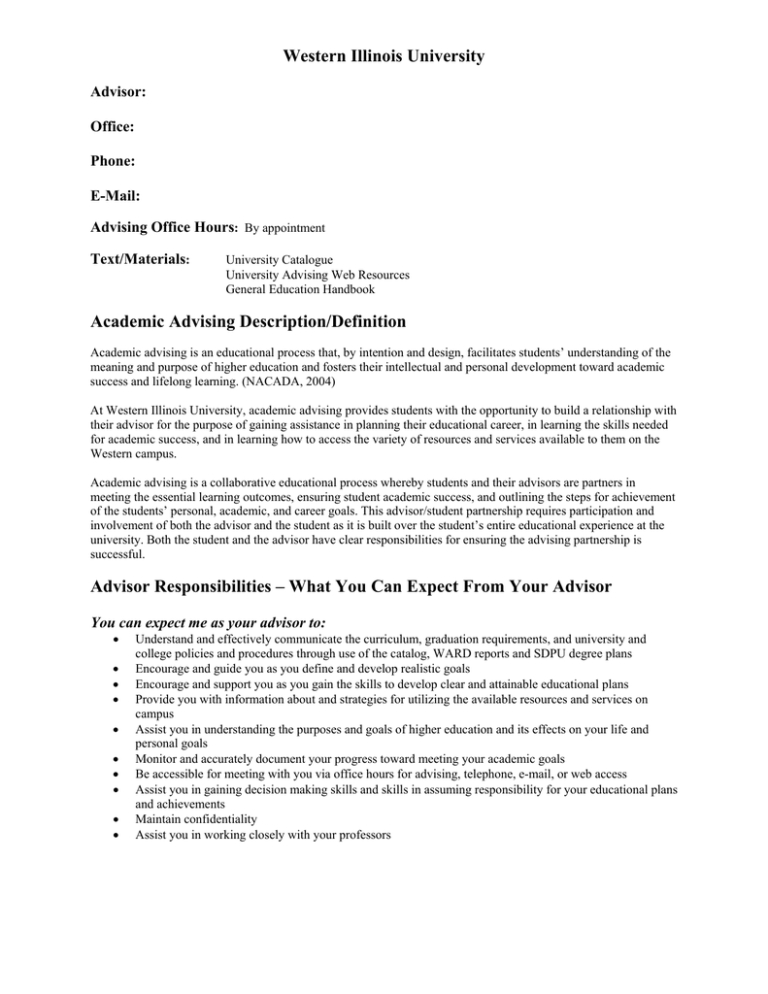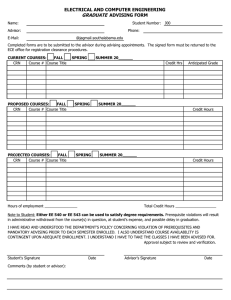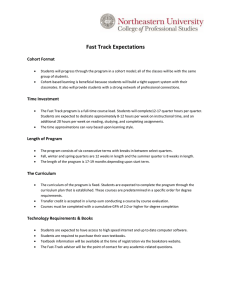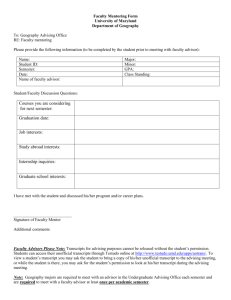Western Illinois University Academic Advising Description/Definition Advisor:
advertisement

Western Illinois University Advisor: Office: Phone: E-Mail: Advising Office Hours: By appointment Text/Materials: University Catalogue University Advising Web Resources General Education Handbook Academic Advising Description/Definition Academic advising is an educational process that, by intention and design, facilitates students’ understanding of the meaning and purpose of higher education and fosters their intellectual and personal development toward academic success and lifelong learning. (NACADA, 2004) At Western Illinois University, academic advising provides students with the opportunity to build a relationship with their advisor for the purpose of gaining assistance in planning their educational career, in learning the skills needed for academic success, and in learning how to access the variety of resources and services available to them on the Western campus. Academic advising is a collaborative educational process whereby students and their advisors are partners in meeting the essential learning outcomes, ensuring student academic success, and outlining the steps for achievement of the students’ personal, academic, and career goals. This advisor/student partnership requires participation and involvement of both the advisor and the student as it is built over the student’s entire educational experience at the university. Both the student and the advisor have clear responsibilities for ensuring the advising partnership is successful. Advisor Responsibilities – What You Can Expect From Your Advisor You can expect me as your advisor to: • • • • • • • • • • Understand and effectively communicate the curriculum, graduation requirements, and university and college policies and procedures through use of the catalog, WARD reports and SDPU degree plans Encourage and guide you as you define and develop realistic goals Encourage and support you as you gain the skills to develop clear and attainable educational plans Provide you with information about and strategies for utilizing the available resources and services on campus Assist you in understanding the purposes and goals of higher education and its effects on your life and personal goals Monitor and accurately document your progress toward meeting your academic goals Be accessible for meeting with you via office hours for advising, telephone, e-mail, or web access Assist you in gaining decision making skills and skills in assuming responsibility for your educational plans and achievements Maintain confidentiality Assist you in working closely with your professors Advisee Responsibilities – What You Are Expected To Do As an advisee, you have clear responsibilities in the advising partnership in order to be successful: • • • • • • • • • • • • • Schedule regular appointments or make regular contacts with me during each semester Come prepared to each appointment with questions or material for discussion Be an active learner by participating fully in the advising experience Learn how to use the catalog, WARD reports and Student Degree Plans Ask questions if you do not understand an issue or have a specific concern Keep a personal record of your progress toward meeting your goals Organize official documents in a way that enables you to access them when needed Complete all assignments or recommendations as advised Gather all relevant decision-making information Clarify personal values and goals and provide me with accurate information regarding your interests and abilities Become knowledgeable about college programs, policies, and procedures Accept responsibility for your decisions Check your ECOM account regularly Expected Student Learning Outcomes for the Academic Advising Experience Through the academic advising experiences at Western Illinois University, • • • • • • • Students will demonstrate the ability to make effective decisions concerning their degree and career goals Students will develop an educational plan for successfully achieving their goals and select courses each semester to progress toward fulfilling that educational plan Students will demonstrate an understanding of the value of the general education requirements Students will utilize the resources and services on campus to assist them in achieving their academic, personal, and career goals Students will make use of referrals to campus resources as needed Students will be able to accurately read and effectively utilize a degree audit (WARD report) and the Student Degree Plan (SDPU screen) in their educational planning Students will graduate in a timely manner based on their educational plan Demonstrating Your Achievement of Learning Outcomes In order for you and your advisor to accurately measure and document that you have achieved the learning outcomes for academic advising, the two of you will develop an on-going portfolio of your advising work. This portfolio will consist of a variety of documents including your educational plan, your semester schedules, collaborative work done due to various referrals on campus, and a variety of documents that you and your advisor will develop together to demonstrate your achievement of these outcomes. Assistance with Issues Involving Disabilities Western Illinois University is dedicated to providing equal opportunity and access for every student. It is important that if you feel that you need accommodations for a learning or physical disability that you make your advisor aware of these accommodations. In some cases, your advisor may refer you to the Disability Support Services Office for assistance. The staff of Disability Support Services (DSS) provides a broad range of supportive services in an effort to ensure that the individual needs of each student are met. In addition, the DSS staff functions as an advocate for students with disabilities on the Western campus. Through active involvement with all areas of the University, the office is able to monitor conditions relevant to students with disabilities and to provide help with decisions affecting their quality of life. Adapted from Academic Advisor Syllabus found on National Academic Advising Association webpage. Original document prepared by Dr. Charles Nutt, Associate Director, NACADA Executive Office.



